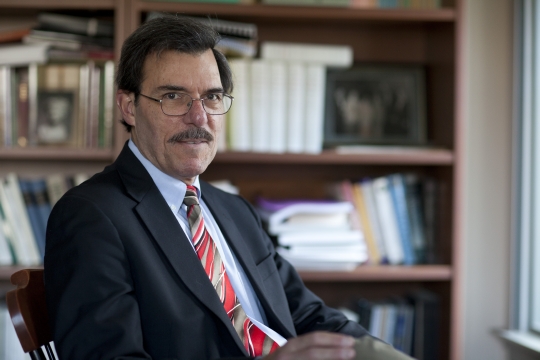This fall, a new public lecture series from the University of Virginia’s College of Arts & Sciences will feature renowned faculty members who hold endowed professorships sharing their research and expertise.
The series is designed to allow faculty members at the top of their fields to share their work with the greater University community, as well as the public, and to highlight the wealth of intellectual resources made possible by the College’s endowed professorships, said Meredith Jung-En Woo, the Buckner W. Clay Dean of Arts & Sciences.
“I think it’s fundamentally important that we have dialogue among the disciplines, and that dialogue must bring our stellar scholars in contact with colleagues, students, graduate students and the public,” Woo said. “Two of the main reasons for this lecture series are to show appreciation and recognition of the outstanding minds in our midst, and to try and enhance an intellectual community in the College that is larger than any single discipline.”
The series includes three lectures this fall, beginning with John Miller, the Arthur F. and Marian W. Stocker Professor of Classics and chair of the Classics Department. His lecture, “Virgil’s Salian Hymn to Hercules,” begins at 5 p.m. on Sept. 27 in the Gibson Room in Cocke Hall.
On Oct. 25, biology professor Butch Brodie, B.F.D. Runk Professor of Botany, will speak. The last lecture of the semester will feature economics professor Alan Taylor, Souder Family Professor of Arts & Sciences, on Nov. 27. All of the talks are free and open to the public.
“These lectures are an opportunity for both the University community and the greater Charlottesville community to learn about these faculty members and get to know a little bit more about their research,” said Cristina Della Coletta, associate dean for humanities and the arts.
The professorship Miller currently holds was created by a bequest from former classics professor Arthur F. Stocker, who joined the faculty in 1946 and retired in 1984. Miller, who arrived at U.Va. in 1984, said he came to know Stocker well prior to his death in 2010 at age 95.
“It means a lot to me personally to be honored by holding a professorship in Arthur’s name,” Miller said. “He was an important figure in our department, and this professorship is part of his legacy and something he created for us on the department’s behalf.”
Though they just missed overlapping in the department, Miller and Stocker shared a scholarly interest in Virgil, a Roman poet of the first century B.C. Miller, who specializes in Roman literature as it relates to religion, will focus his Sept. 27 lecture on Virgil’s epic, the “Aeneid.”
The story follows Aeneas, a mythical Trojan ancestor to the Romans, and is a creative combination of a mythological epic and historical epic that also reflects the political realities of Virgil’s day, Miller said.
“On the one hand, Virgil is telling us a story set in mythical antiquity, which features Trojans coming to Italy to found a new settlement,” he said. “But while he’s telling that story, he’s also projecting into the future Rome – his present Rome – in various ways.”
Miller’s talk will focus on an important date in August that demonstrates this effect. In the story, there is a festival for Hercules on the site that will someday be Rome. In Virgil’s day, a Roman festival was held on the same date. Emperor Augustus, who ruled when Virgil was alive, also used that date to commemorate his return to Rome after a series of important military victories, including those over Marc Anthony and Cleopatra, thus associating himself with Hercules.
“So you have these layers of history all being played out,” Miller said. “And Virgil is reflecting all of these things simultaneously through this kind of wormhole effect in the narrative, where different eras in time are all collapsing on this one day and radiating out.”
The “hymn to Hercules” in the title of Miller’s lecture refers to a hymn sung by Salian priests, an obscure Roman cult whose religious songs weren’t understood by anyone – including the priests themselves – but Augustus revived the order and had his name added to the list of gods the hymn was sung to, Miller said. Virgil featured these priests and their hymn in the “Aeneid.”
“For Virgil to have Salian priests sing a hymn to Hercules is very creative in all sorts of ways. He’s in a sense modernizing a hymn that nobody can understand in his day. And, in the content of the hymn, he’s reflecting the addition of Augustus to the hymn in his modern day. The question I ask in the talk is: Why are the priests, anachronistically, singing a hymn to Hercules in mythical times?”
Media Contact
Article Information
September 19, 2012
/content/new-series-public-lectures-feature-top-college-arts-sciences-faculty

